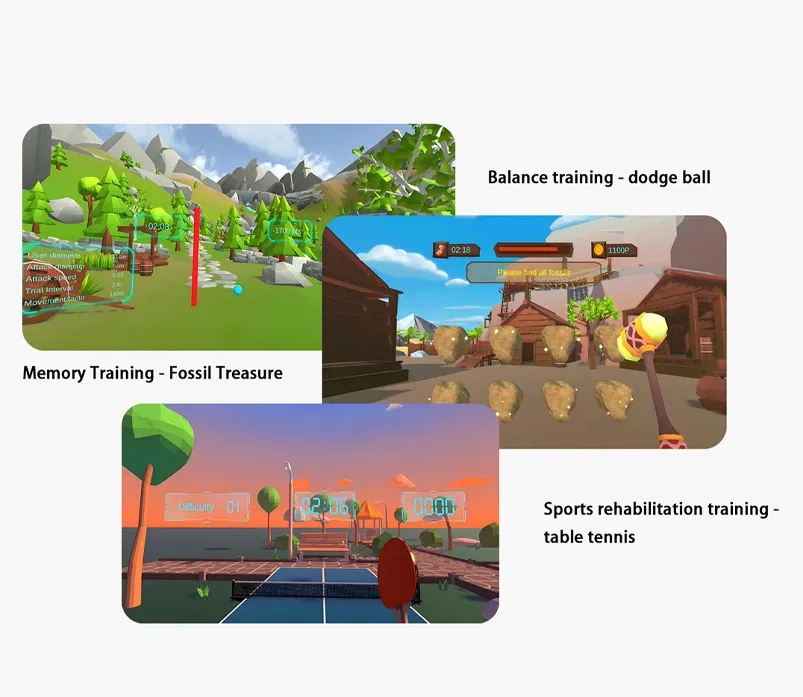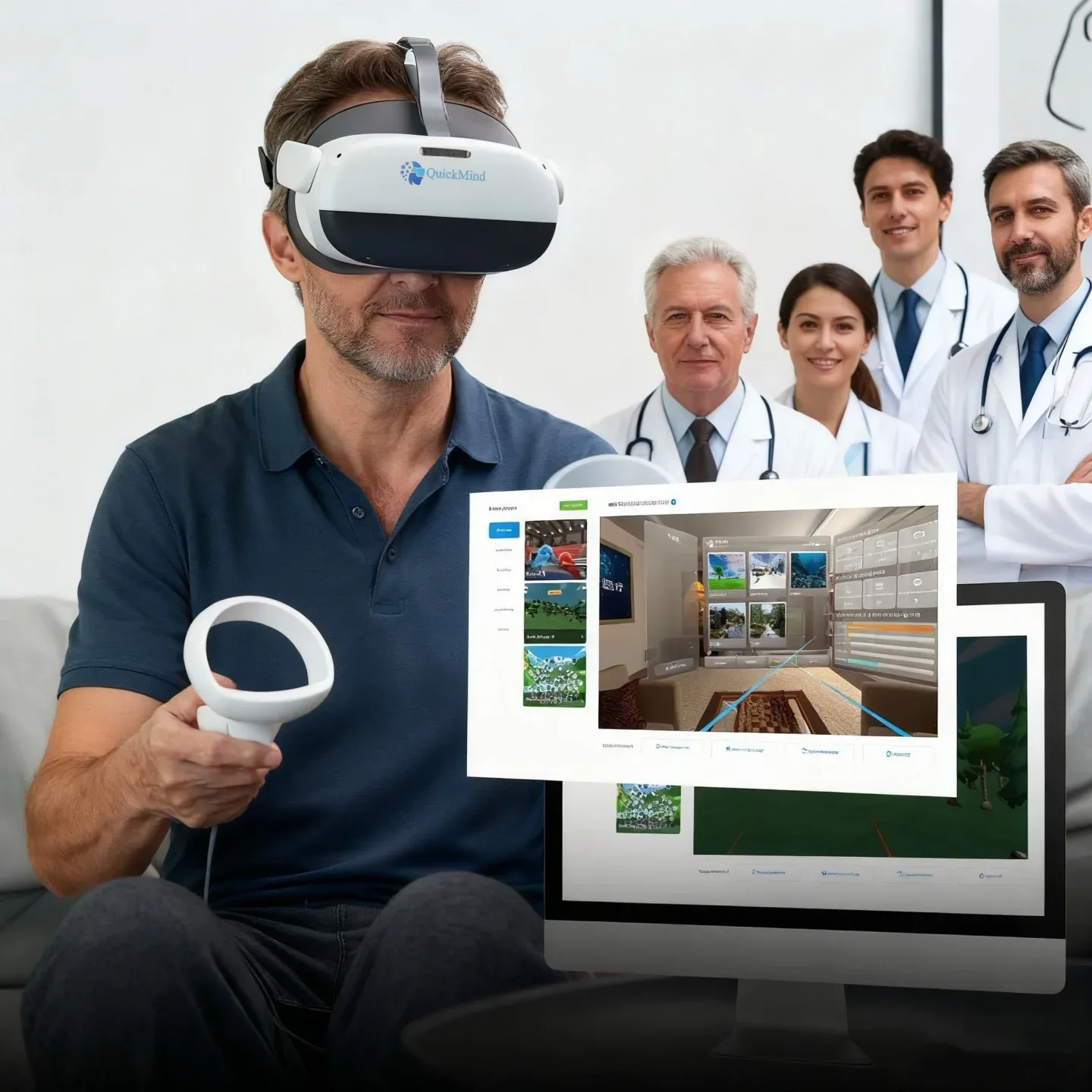
Expanding assessments indicates that interactive virtual spaces modality can considerably upgrade the welfare of individuals diagnosed with age-related cognitive diseases. By taking them to serene backgrounds, VR supplies a novel possibility for mind energizing, emotional regulation, and personal connection. Various research works have revealed that VR therapy can lower distress, nervousness, and gloom in dementia subjects while also raising their mindfulness, engagement, and linguistic talents.
- VR provides clients with dementia to reexperience esteemed pasts through collaborative reenactments.
- Moreover, it can provide a harmless and helpful space for socialization, nurturing a sense of relationship and togetherness.
- Experts assert that VR therapy has the promise to modernize dementia support by offering new and creative approaches to confront the hard issues faced by individuals diagnosed with this ailment.
Advanced Digital Care for Cognitive Support in Alzheimer's
Expanding electronic remedies are exhibiting benefits in the sector of neural stimulation for subjects experiencing cognitive Alzheimer's illness. These tools exploit software solutions to strengthen brain capacity and conceivably slow down the development of the health issue. Engaging tasks, personalized feedback, and brain-computer training are some cases of strategies being researched in this flourishing sector. While research are happening, digital therapeutics afford a complementary pathway for enhancing the health of those managing neurodegenerative Alzheimer type.Digital Terrain Exploration in Alzheimer's Disease Management
Touching patients suffering from Alzheimer syndrome, the incremental diminution of remembrance and brain functions can drastically reduce their facility to socialize with the surrounding environment. This devastating illness often causes in withdrawal, upset, and a impaired self-perception. Contemporary enhancements in virtual reality technology show a cutting-edge chance to mitigate these issues by building immersive environments that can enhance the brain and revive cognitive function.
Artificial reality spaces tailored specifically for Alzheimer's individuals can convey them in recognizable settings, such as their childhood home or a beloved garden, evoking positive memories and mitigating anxiety. Through interactive tasks, these virtual domains can also test cognitive abilities like remembrance, focus, and decision-making.
The advantages of virtual reality in Alzheimer's therapy are massive. Early analyses have demonstrated hopeful results, with individuals experiencing improvements in cognitive ability, mood, and overall quality of life. As this platform develops, it holds the key to reshaping the way we approach Alzheimer's disease, making available a new pathway for management and strengthening.
Immersive Reminiscence Sessions in Alzheimer's
Reminiscence therapy is a popular technique used to enhance cognitive function and psychological wellness in individuals with Alzheimer's disease. This long-standing form of therapy involves motivating patients to narrate past experiences, often through talks. However, a revolutionary approach is emerging: VR-mediated reminiscence therapy.
This immersive system utilizes virtual reality headsets to transfer patients in faithful environments that arouse memories from their past. By participating these digital reconstructions, individuals with Alzheimer's can communicate with their past in a expressive way.
Can VR Help Fight Dementia? Exploring the Impact on Memory and Cognitive Function
Virtual reality (VR) is emerging as a up-and-coming instrument in the fight against dementia, granting advanced ways to invigorate memory and cognition. By building immersive settings, VR can assist individuals with dementia recover memories, take part in meaningful activities, and strengthen cognitive skills. Studies have demonstrated that VR interventions can generate considerable improvements in memory recall, attention, and navigational awareness. Moreover, VR provides a controlled and favorable space for individuals with dementia to display, reducing feelings of isolation and concern.
- In addition, VR can be tailored to individual needs and preferences, helping improved levels of communication.
- In spite of the possibilities of VR, more research is needed to fully understand its long-term effectiveness in dementia care.
Rekindling Memories, Rebuilding Connections: VR's Impact on Social Engagement in Alzheimer's Disease
Artificial simulated realms is emerging as a trailblazing solution in the branch of dementia care. By crafting immersive and dynamic worlds, VR has the potential to awaken memories, promote social interaction, and enhance the overall quality of life for people suffering from Alzheimer's. Considered one of the influential aspects of VR is its ability to transfer users to classic areas and journeys from their past. Whether it's a jaunt inside a childhood home or a illustration Cognitive function assessment of a beloved holiday, these virtual escapades can evoke happy memories and deepen cognitive abilities. Furthermore, VR can aid social interaction by coupling individuals with others who share similar traits. This can be particularly helpful for people with Alzheimer's who may face difficulties with traditional social involvement. By offering a safe and absorbing virtual space, VR can diminish feelings of isolation and loneliness, which are common among users struggling with Alzheimer's. Overall, VR holds immense opportunity for transforming the lives of subjects with Alzheimer's by revitalizing memories, repairing connections, and refining their quality of life. As technology proceeds to progress, we can expect even more imaginative applications of VR in the field of dementia care.Leveraging Cognitive Training: Harnessing VR for Alzheimer's Therapy
Immersive reality systems is rapidly emerging as a game-changing tool in the realm of cognitive training, particularly for participants affected by Alzheimer's disease. By immersing patients in interactive and engaging virtual environments, VR-based interventions can augment cognitive functions such as memory, attention, and problem-solving. These games often incorporate elements of storytelling, exploration, and social interaction, making the training process increasingly entertaining. Studies have shown that VR-based cognitive training can lead to measurable improvements in cognitive performance, potentially delaying the progression of Alzheimer's symptoms. Moreover, VR provides a safe and controlled environment for patients to practice new skills and enhance their confidence.
- Game-enhanced procedures in VR training can make it very enjoyable and involving for individuals with cognitive impairments.
- VR simulations can offer realistic scenarios that challenge and stimulate cognitive functions.
- Personalized VR experiences can cater to unique demands and approaches.
VR Platforms as Therapeutic Solutions for Dementia
Immersive VR experiences offer a fresh and promising avenue for individuals living with dementia. These methodologies can emulate familiar environments, allowing those affected by cognitive decline to experience cherished memories and build a sense of well-being. By combating the problems of dementia, VR scenarios have the ability to refine quality of life for both patients and their families.
- Investigations indicate that VR approaches can significantly impact cognitive function, behavioral well-being, and even locomotor abilities in individuals with dementia.
- Moreover, VR offers a safe and regulated environment for participation, reducing the risk of stress.
- Additionally, VR can boost social links by allowing individuals with dementia to connect in online activities with others.
Virtual Reality as a Tool for Early Detection and Intervention in Alzheimer's Disease
Alzheimer's condition poses a challenging obstacle, often continuing unnoticed in its early stages. Still, virtual reality (VR) is developing as a state-of-the-art tool for initial identification. Through immersive computer-generated settings, VR can assess cognitive abilities in ways that traditional methods are inadequate to. This promise allows for prompt management strategies, potentially inhibiting disease progression and boosting the quality of life for people with Alzheimer's.
- VR systems measure cognitive responses such as memory and spatial awareness within controlled environments.
- Adaptive virtual reality tools motivate subjects to engage in neural stimulation efforts.
- Simulated realities offer inclusive spaces for Alzheimer's patients to associate and communicate.
Using Virtual Reality to Improve Linkages and Involvement in Dementia
{In the realm of dementia care, innovative technologies are emerging to advance the lives of people affected by dementia. Virtual reality (VR) is one such system that holds immense possibility for strengthening interaction and communication for dementia sufferers via VR. By offering absorbing computer-generated environments, VR can invoke cognitive function, reduce behavioral issues, and ultimately improve the overall well-being of people living with dementia.
VR experiences focused on dementia patient engagement can range from reminiscence therapy sessions that fade patients back into earlier life scenes, to interactive games that promote social interaction and cognitive stimulation. Furthermore, VR has the skill to connect clients facing dementia with social networks, regardless of physical distance, fostering a sense of connection.
- VR can aid in reducing agitation and anxiety by providing a calming and distracting environment.
- Studies have shown that VR interventions can lead to improvements in cognitive function, mood, and social interaction in users diagnosed with dementia.
- As technology evolves in advance, we can expect even more innovative and {effective|beneficial|helpful|powerful|impactful|successful|productive|efficient
